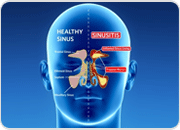






 Crohn’s disease, also known as Crohn syndrome and Regional enteritis, is a type of inflammatory bowel disease (IBD) that may affect any part of the gastrointestinal tract from mouth to anus, especially the colon and ileum, associated with ulcers and fistulae.
Crohn’s disease, also known as Crohn syndrome and Regional enteritis, is a type of inflammatory bowel disease (IBD) that may affect any part of the gastrointestinal tract from mouth to anus, especially the colon and ileum, associated with ulcers and fistulae.
Crohn’s disease can be both painful and debilitating, and sometimes may lead to life-threatening complications.
The exact cause of Crohn’s disease remains unknown. Previously, diet and stress were suspected, but now doctors know that these factors may aggravate but don’t cause Crohn’s disease.
Immune system –Usually, cells of the immune system defend the body from harmful microbes – bacteria, viruses, fungi, and other foreign substances – that have entered it. Many microbes are helpful, especially for digestion. And so the immune system leaves them alone.
If there is an invader that needs to be eliminated, your body’s defense reaction begins. This immune system response causes inflammation. Immune system cells, chemicals, and fluids flood to the site to overcome the offending substance. After the substance has been disabled or removed, the immune response ends. Inflammation subsides.
The main symptoms of Crohn’s disease include:
People with severe Crohn’s disease may also experience:
The proper analysis of the case with the qualified homoeopathic physician will give the better results. In homoeopathy medicine like Merc Cor, Nux Vom, Aesculus are used for the treatment.